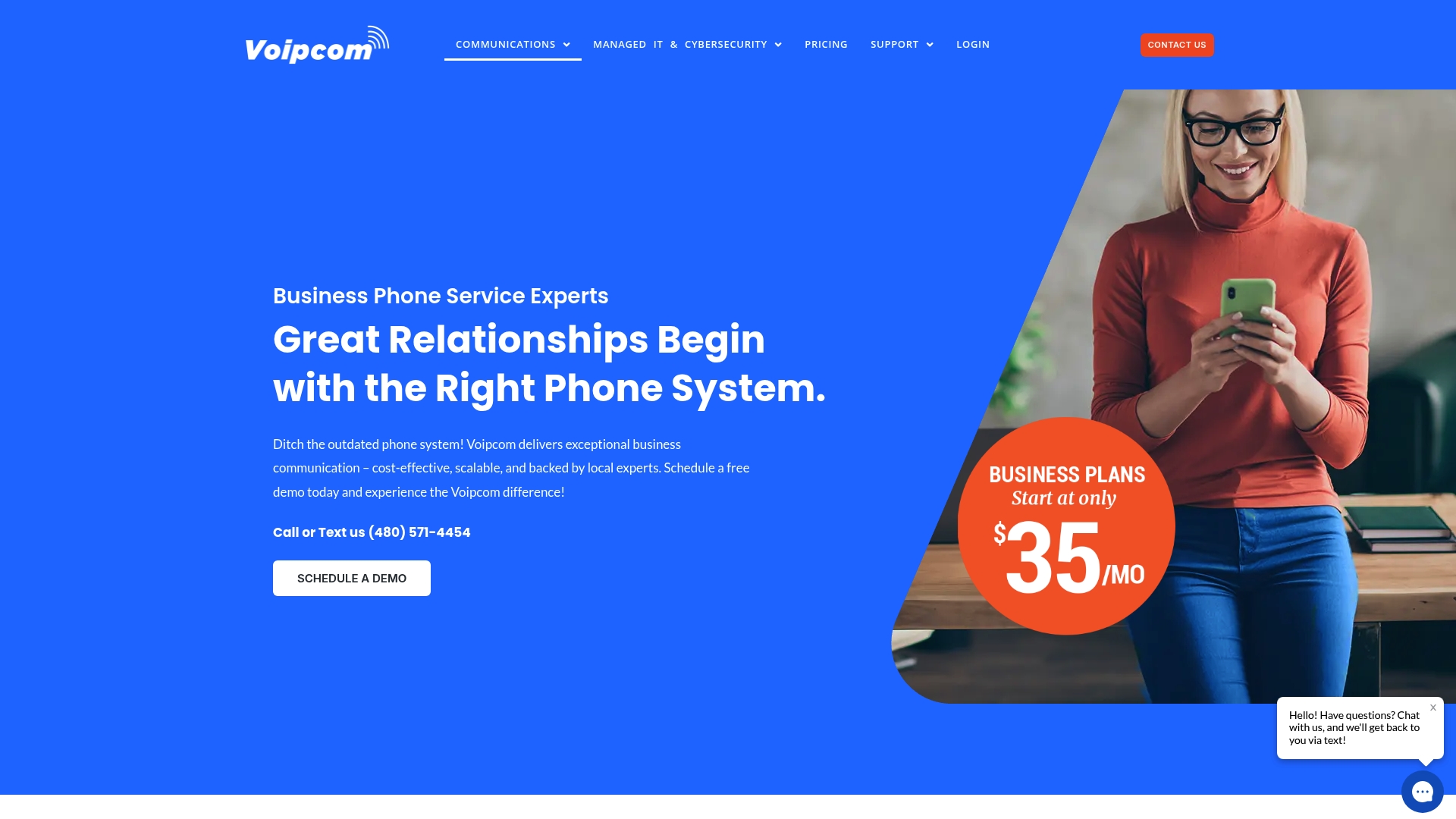Over 70 percent of businesses have switched to internet-based phone systems in the past few years, transforming how teams communicate and connect with customers. As remote work and flexible offices become the norm, companies need smarter ways to collaborate without the high costs of traditional phone lines. VoIP solutions promise seamless calls, real-time integrations, and mobility that keep your business agile and competitive in a world where every conversation counts.
Key Takeaways
| Point | Details |
|---|---|
| VoIP Advantages | VoIP enhances communication efficiency, lowers costs, and improves customer experience through advanced features and CRM integrations. |
| Solution Types | Businesses can choose from Hosted PBX, Enterprise VoIP, or UCaaS, depending on their specific needs and size. |
| Implementation Strategy | Successful VoIP adoption requires assessing current infrastructure, ensuring scalability and mobility, and developing a comprehensive migration plan. |
| Compliance and Security | Organizations must prioritize compliance and security by integrating with existing systems and implementing robust security measures and protocols. |
Table of Contents
- Defining VoIP And Its Business Benefits
- Types Of VoIP Solutions For Companies
- Planning VoIP Implementation For SMBs
- Essential Integration And Compliance Steps
- Cost Factors, Risks, And Avoiding Common Pitfalls
Defining VoIP and Its Business Benefits
Business communication is evolving, and Voice over Internet Protocol (VoIP) is leading the transformation. Unlike traditional phone systems that rely on copper telephone lines, VoIP converts voice signals into digital data transmitted through internet connections. This revolutionary technology allows businesses to communicate more efficiently, flexibly, and cost-effectively.
According to the US Chamber of Commerce, cloud-based VoIP systems deliver significant advantages for modern businesses:
- Lower operational costs through internet-based communication
- Enhanced operational efficiency with integrated communication tools
- Improved customer experience via advanced CRM integrations
- Virtualization features like softphone access across multiple devices
As Vonage research highlights, VoIP offers businesses unprecedented communication capabilities. These include:
- Seamless device mobility
- Advanced features like voicemail-to-email
- Automated call routing
- High-definition voice quality
- Real-time communication analytics
By reading more about the role of VoIP in business communications, you’ll discover how this technology can transform your organization’s communication infrastructure. VoIP isn’t just a phone system—it’s a strategic business tool that connects teams, enhances productivity, and provides a competitive communication advantage.
Types of VoIP Solutions for Companies
Businesses today have multiple VoIP solution categories that cater to different communication needs and organizational sizes. Understanding these options helps companies select the most appropriate technology for their specific requirements.
Hosted PBX Solutions
Hosted PBX (Private Branch Exchange) systems represent a cloud-based approach where phone systems are managed entirely off-site. These solutions eliminate the need for complex on-premises hardware and provide businesses with flexible, scalable communication infrastructure. Learn more about our VoIP provider strategies to understand how these systems work.
Enterprise-Level VoIP Platforms
According to research, enterprise-level VoIP platforms offer comprehensive communication ecosystems. For instance, companies like Ooma provide multiple business-oriented tiers:
- Ooma Office: Basic communication features
- Ooma Office Pro: Advanced conferencing capabilities
- Ooma Office Pro Plus: Enhanced CRM integrations
- Ooma Enterprise: Full-scale unified communication solutions
Unified Communications as a Service (UCaaS)
UCaaS platforms combine multiple communication channels into a single integrated system. As highlighted by BroadVoice’s research, these solutions typically include:
- Virtual call center tools
- Cloud PBX platforms
- Mobile app support
- Softphone capabilities
- Automatic call routing
- Comprehensive call recording
By understanding these VoIP solution types, businesses can strategically select a communication platform that aligns with their operational goals and technological requirements.
Here’s how the main VoIP solution types for businesses compare:
| Solution Type | Key Features | Ideal For |
|---|---|---|
| Hosted PBX | Cloud-based No on-site hardware Flexible & scalable |
Small to midsize businesses |
| Enterprise VoIP | Multiple tiers Advanced conferencing CRM integrations |
Large organizations Enterprises |
| UCaaS | Unified communications Mobile/softphone support Call analytics |
Businesses seeking integrated tools |
Planning VoIP Implementation for SMBs
Strategic VoIP implementation requires careful planning and understanding of your business communication needs. Small and medium-sized businesses (SMBs) can leverage this technology to transform their communication infrastructure, but successful adoption demands a methodical approach.
Assessing Current Communication Infrastructure
Before transitioning, evaluate your existing communication systems. Explore how VoIP systems help small businesses grow to understand the potential transformation. Key considerations include:
- Current internet bandwidth and reliability
- Number of users and expected growth
- Integration requirements with existing business tools
- Budget constraints
- Remote work requirements
Implementation Roadmap
According to research from Bonline, SMBs should focus on these critical implementation aspects:
- Scalability: Choose a system that allows easy user addition or reduction
- Mobility: Ensure softphone and app compatibility
- Integration: Select platforms that seamlessly connect with CRM and productivity tools
- Call Quality: Prioritize HD voice and reliable connection
Technical Preparation
Threat Alliance research highlights essential technical preparation steps:
- Conduct a comprehensive network assessment
- Upgrade internet infrastructure if necessary
- Train staff on new communication tools
- Develop a phased migration strategy
- Establish backup communication protocols
By approaching VoIP implementation strategically, SMBs can unlock powerful communication capabilities while minimizing disruption to daily operations.
Essential Integration and Compliance Steps
VoIP integration goes far beyond simply replacing traditional phone systems. It represents a comprehensive communication strategy that requires careful planning, technological compatibility, and strict adherence to industry compliance standards.
CRM and Productivity Tool Integration
According to Vonage research, modern VoIP platforms offer seamless integration capabilities that transform business communication:
- Click-to-dial functionality
- Automatic call logging and tracking
- Unified communications across multiple channels
- Synchronization with email and messaging systems
- Real-time data sharing between communication platforms
Compliance Considerations
Businesses must navigate several critical compliance requirements when implementing VoIP solutions:
- HIPAA compliance for healthcare organizations
- PCI-DSS standards for financial transaction security
- Data privacy regulations specific to your industry
- Encryption protocols for voice and messaging data
- Secure user authentication mechanisms
Security Implementation Steps
- Conduct a comprehensive security audit
- Implement multi-factor authentication
- Establish robust user access controls
- Create detailed communication logs
- Develop incident response protocols
Discover how our VoIP solutions support business compliance and streamline your communication infrastructure while maintaining the highest security standards.
Cost Factors, Risks, and Avoiding Common Pitfalls
VoIP adoption represents a strategic investment that requires careful financial and technological planning. While the benefits are substantial, businesses must navigate potential challenges with informed decision-making and proactive risk management.
Financial Considerations
VoIP technologies offer significant cost advantages, but understanding the total cost of ownership is crucial:
- Upfront hardware and infrastructure investments
- Monthly subscription fees
- Training and implementation expenses
- Potential network upgrade requirements
- Long-term scalability costs
Mitigating Technical Risks
According to the US Chamber of Commerce, businesses must implement robust failover strategies:
- Backup internet connectivity
- Redundant power sources
- Alternative call routing mechanisms
- Emergency communication protocols
Cybersecurity and Reliability Challenges
Threat Alliance research highlights critical risk mitigation strategies:
- Implement strong encryption protocols
- Select vendors with proven security track records
- Regularly update security configurations
- Conduct periodic vulnerability assessments
- Train staff on potential cyber threats
Learn more about managing VoIP implementation risks to ensure a smooth, secure transition for your business communications infrastructure.
Ready to Simplify and Secure Your Business Communication?
Are you struggling with high phone system costs, outdated equipment, or complex communication setups? This guide showed how VoIP can reduce expenses, boost flexibility, and increase productivity for your growing business. Voipcom specializes in transforming these pain points into opportunities with cloud-based phone solutions that keep you connected and protected. Our managed services ensure reliable implementation, seamless integrations, and total compliance, even for remote work and hybrid teams. For SMBs looking to upgrade, our platform brings together voice, messaging, AI tools, and cybersecurity support all under one transparent and predictable price.
Stop letting legacy phone systems slow down your business. Visit Voipcom to see how our tailored VoIP solutions make transitions easy and risk-free. Connect with our expert team here for local advice and a personalized plan. Take the first step today—let Voipcom help your business communicate smarter and grow stronger.
Frequently Asked Questions
What is VoIP and how does it benefit businesses?
Voice over Internet Protocol (VoIP) converts voice signals into digital data transmitted over the internet, enabling efficient and cost-effective communication. Benefits include lower operational costs, enhanced efficiency, improved customer experience, and virtualization features like softphone access across multiple devices.
What types of VoIP solutions are available for companies?
There are several types of VoIP solutions, including Hosted PBX systems that are cloud-based with no on-site hardware, Enterprise-Level VoIP platforms with multiple tiers of services, and Unified Communications as a Service (UCaaS) that integrate multiple communications channels into a single platform.
How do I plan for VoIP implementation as a small or medium-sized business?
Start by assessing your current communication infrastructure, including internet bandwidth and integration requirements. Develop an implementation roadmap focusing on scalability, mobility, and call quality while preparing your network and training staff on the new tools.
What compliance and security measures should I consider when adopting VoIP?
Ensure compliance with relevant regulations such as HIPAA or PCI-DSS, and implement strong security measures like multi-factor authentication, encryption protocols, and user access controls to protect your communication data.





